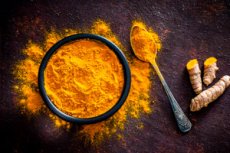New publications
Curcumin nanoparticles show promise in treating neurodegenerative diseases
Last reviewed: 02.07.2025

All iLive content is medically reviewed or fact checked to ensure as much factual accuracy as possible.
We have strict sourcing guidelines and only link to reputable media sites, academic research institutions and, whenever possible, medically peer reviewed studies. Note that the numbers in parentheses ([1], [2], etc.) are clickable links to these studies.
If you feel that any of our content is inaccurate, out-of-date, or otherwise questionable, please select it and press Ctrl + Enter.

In a recent review article published in the journal Foods, Italian researchers described the neuroprotective role of curcumin and curcumin-containing nanoparticles in neurodegenerative diseases.
Curcumin is a hydrophobic polyphenol found in the rhizome of Curcuma longa. It has a wide range of biological properties, including anti-inflammatory, antioxidant, antiproliferative, anticancer, immunomodulatory, antimicrobial, antidiabetic, and neuroprotective functions.
These pharmacological properties make curcumin a promising candidate for the treatment of neurodegenerative diseases such as Parkinson's disease (PD), Alzheimer's disease (AD), Huntington's disease (HD), multiple sclerosis (MS), amyotrophic lateral sclerosis (ALS) and prion diseases.
Problems with Curcumin Use
However, the clinical use of curcumin is limited due to its low water solubility, poor stability, rapid metabolism, slow absorption rate, low bioavailability, and poor ability to cross the blood-brain barrier.
Curcumin nanoparticles
To overcome these limitations, curcumin-containing biomimetic nanomedicines prepared using cell membranes and extracellular vesicles have been developed. Curcumin-containing porous poly(lactic-co-glycolic acid) polymer (PLGA) nanoparticles have been modified with red blood cell membranes to enhance drug release. Curcumin-containing exosomes have been engineered to enhance their ability to cross the blood-brain barrier and facilitate drug delivery to the brain for the treatment of malignant glioma in mice.
Curcumin in Parkinson's Disease (PD)
PD results from the loss of dopaminergic neurons in the substantia nigra. The main features of PD include brain dopamine deficiency and the formation of α-synuclein aggregates.
Curcumin-containing nanoformulations are emerging as promising adjunctive therapies for PD. Various nanoformulations such as alginate-curcumin nanoparticles, curcumin nanoparticles with lactoferrin, spongosomes and cubosomes with curcumin and fish oil, serum albumin-based curcumin nanoformulation, and glyceryl monooleate (GMO) nanoparticles loaded with curcumin and piperine have shown reduction in oxidative stress, brain cell death, and protein aggregation in animal models of PD.
Curcumin in Alzheimer's Disease (AD)
AD occurs due to the accumulation of misfolded β-amyloid protein and tau protein in the neurofibrillary tangles of the brain.
As a therapeutic agent for AD, curcumin reduces inflammation, activates neurogenesis, and inhibits the accumulation of misfolded proteins. In in vitro cell culture models of AD, curcumin encapsulated in biodegradable PLGA nanoparticles reduces oxidative stress and inflammation, and increases protein degradation.
Curcumin for Huntington's Disease (HD)
HD is an autosomal dominant inherited disorder caused by a mutation in the Huntingtin (HTT) gene. The disease is characterized by progressive loss of nerve cells in the brain, leading to motor and cognitive impairment and psychiatric symptoms.
In rat HD models, curcumin encapsulated in solid lipid nanoparticles improved mitochondrial activity, reduced mitochondrial swelling, free radical production and lipid peroxidation, and increased antioxidant levels.
Curcumin in Amyotrophic Lateral Sclerosis (ALS)
ALS is caused by the progressive loss of nerve cells in the spinal cord and brain. The only known treatment for ALS that prolongs survival in early-stage patients is riluzole.
Curcumin loaded into inulin-D-α-tocopherol succinate micelles enhances the therapeutic effects of mesenchymal stromal cells.
Curcumin for Multiple Sclerosis (MS)
MS is an inflammatory autoimmune disease that damages the myelin sheath of nerve fibers in the spinal cord and brain. There is currently no cure for the disease.
Conclusion
Curcumin and curcumin-containing nanoparticles show significant potential in the treatment of neurodegenerative diseases due to their antioxidant, anti-inflammatory and neuroprotective properties. Further research and development may lead to the creation of new effective therapies for these diseases.
